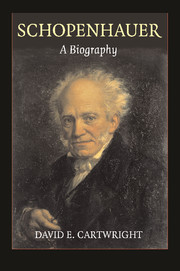Book contents
- Frontmatter
- Contents
- Preface
- Acknowledgments
- Notes on the Text
- Chronology of Schopenhauer's Life and Works
- 1 The Affirmation of the Will
- 2 A Tour for a Trade
- 3 A Father's Death; A Philosopher's Birth
- 4 The University Years
- 5 The Better Consciousness, Causes, Grounds, and Confrontations
- 6 Goethe, Colors, and Eastern Lights
- 7 The Single Thought of Dresden
- 8 Failure in Berlin
- 9 Ich Bin Kein Berliner
- 10 The Frankfurt Philosopher
- 11 The Dawn of Fame and the End of Life
- Works Cited
- Index
1 - The Affirmation of the Will
Published online by Cambridge University Press: 05 April 2014
- Frontmatter
- Contents
- Preface
- Acknowledgments
- Notes on the Text
- Chronology of Schopenhauer's Life and Works
- 1 The Affirmation of the Will
- 2 A Tour for a Trade
- 3 A Father's Death; A Philosopher's Birth
- 4 The University Years
- 5 The Better Consciousness, Causes, Grounds, and Confrontations
- 6 Goethe, Colors, and Eastern Lights
- 7 The Single Thought of Dresden
- 8 Failure in Berlin
- 9 Ich Bin Kein Berliner
- 10 The Frankfurt Philosopher
- 11 The Dawn of Fame and the End of Life
- Works Cited
- Index
Summary
Arthur schopenhauer viewed himself as homeless. This sense of homelessness became the leitmotif of both his life and his philosophy. After the first five years of his life in Danzig, where he was born on 22 February 1788, his family fled the then free city to avoid Prussian control. From that point on, he said, “I have never acquired a new home.” He lived in Hamburg on and off for fourteen years, but he had his best times when he was away from that city. When he left Hamburg, he felt as if he were escaping a prison. He lived for four years in Dresden, but he would only view this city as the birthplace of his principal work, The World as Will and Representation. More than a decade in Berlin did nothing to give him a sense of belonging. He would angrily exclaim that he was no Berliner. After living as a noncitizen resident in Frankfurt am Main for the last twenty-eight years of his life, and after spending fifty years attempting to understand the nature and meaning of the world, he would ultimately conclude that the world itself was not his home. If one were to take this remark seriously, then even Danzig had not been his home. He was homeless from birth. But being homeless from birth did not mean that there was no point to his life. Schopenhauer would also conclude that from birth he had a mission in life.
- Type
- Chapter
- Information
- SchopenhauerA Biography, pp. 1 - 33Publisher: Cambridge University PressPrint publication year: 2010



